At Trinity Logistics, we’ve always believed in doing the right thing. That concept is foundational and woven into the fabric of our company culture, from the services we provide to the impact we aim to make on the world around us. Being sustainable is an important focus for the company. It’s a responsibility we take seriously, so our sustainability initiatives are no afterthought.
Logistics Environmental Sustainability
The United Nations defines sustainability as “meeting the needs of the present without compromising the ability of future generations to meet their own needs.”
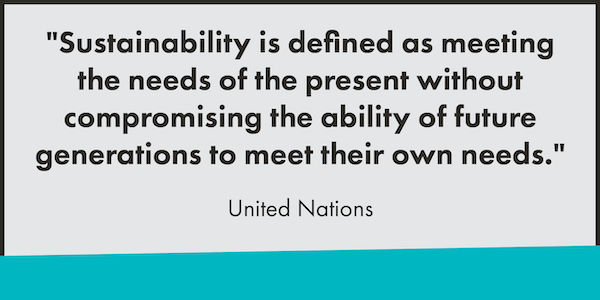
Our company takes that message to heart. We recognize the critical part we play in taking care of our communities, making a positive impact, and reducing our environmental footprint. We want to leave a positive legacy behind that extends beyond our logistics services. This includes our part in taking care of our environment and the communities we touch.
Here’s a glimpse into how we take action to be sustainable.
Paving the Way to Less Emissions with SmartWay
The SmartWay program by the Environmental Protection Agency (EPA) helps companies improve supply chain sustainability and reduce transportation emissions by providing a system to track fuel and emissions so companies can select more efficient carriers and logistics strategies.
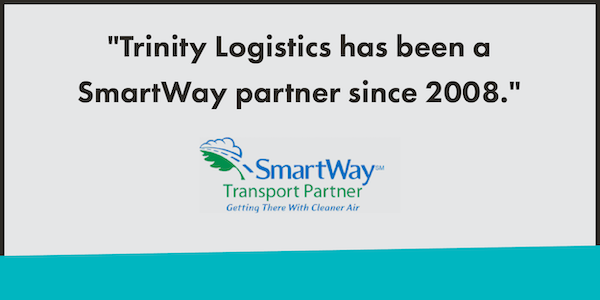
Trinity invested in a SmartWay partnership in 2008, making this our earliest sustainability initiative. This partnership enables us to access and build relationships with SmartWay-certified carriers that commit to tracking and minimizing their emissions. We’re able to leverage that network, empowering our shipper relationships to make sustainable choices by using these SmartWay-certified carriers whenever possible.
Chemical Safety with Responsible CareⓇ
Responsible CareⓇ is the chemical industry’s environmental, health, safety, and security initiative, hosted by the American Chemical Council.
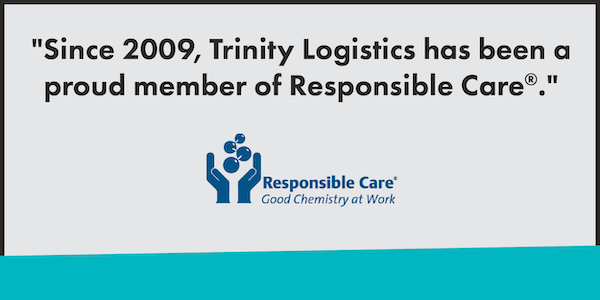
Since 2009, Trinity has been a proud member of Responsible CareⓇ. Some of the ways we take this sustainability initiative into action include;
- carrying pollution liability coverage to cover costs associated with pollution clean-up or other pollution-related liability claims;
- stringent carrier vetting to select the right carrier with the right requirements, like being hazmat-certified;
- ongoing required Team Member training to maintain knowledge of proper procedures, especially regarding chemical transportation.
Offsetting Carbon Footprint in Logistics with ClimeCo
ClimeCo is a non-profit organization that helps companies offset their emissions by donating funds towards sustainable projects.
Trinity Logistics understands that climate change is a pressing issue, so we’re committed to doing our part. In 2022, we began collaborating with Carbonfund, now known as ClimeCo. At the end of each fiscal year, we calculate the electricity usage of our owned facilities. With that calculation, ClimeCo helps us identify sustainable projects to donate to and offset the emissions we produced that year.
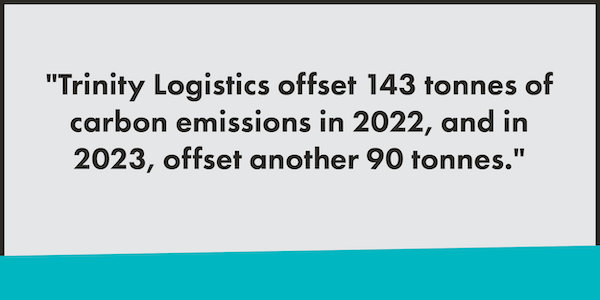
We’ve already made a difference by contributing to the Texas Capricorn Ridge Wind Project and N20 Abatement Project. In 2022 alone, we offset 143 tonnes of carbon emissions, and in 2023, we mitigated another offset of 90 tonnes. That’s a win for the environment and a win for future generations.
Building Sustainability in Our Offices
Sustainability isn’t only about grand gestures; it’s about the everyday choices we make. That’s why we seek out sustainable practices within our own facilities.
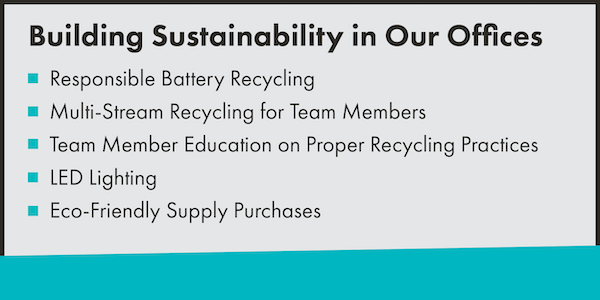
We offer convenient battery recycling through a partnered vendor, ensuring they’re disposed of responsibly. We also ensure any used paint gets recycled instead of ending up in landfills.
We offer multi-stream recycling to our Team Members as well. Each Team Member has their own container to recycle any paper documents, while a large bin outside collects glass and recyclable plastics. Knowledge is power, so we educate our Team Members on proper recycling practices, too.
Our Facilities Team also aims to make sustainable purchases as often as possible. They’ve already converted any lighting in our owned offices to energy-efficient LEDs. They also focus on purchasing eco-friendly supplies that are compostable and certified sustainable. For example, they buy compostable paper plates and takeout containers for our weekly lunches.
Recognizing the Power of Remote Work for A Cleaner Environment
We recognize the many benefits of remote work. It fosters a vibrant company culture, empowers our Team Members with greater flexibility, and contributes to a greener future. By embracing remote and hybrid work positions, we help reduce emissions from daily commutes and cut our office space requirements.
Currently, around 50 percent of our positions offer remote or hybrid options, allowing our Team Members to focus on time with their families, contribute to their communities, and be part of this impactful sustainability initiative.

Empowering Shippers with Sustainability
For Trinity, sustainability is about more than our own initiatives. It’s also about helping our relationships find sustainable options in their supply chains.
For each shipment, we’re able to offer guidance on the most efficient transportation modes available. We offer regular business reviews to analyze our shipper relationship’s unique logistics profiles to find and suggest efficiencies. Our Team also works closely with shippers and carriers to tackle deadheading, a large contributor to carbon in the trucking industry.
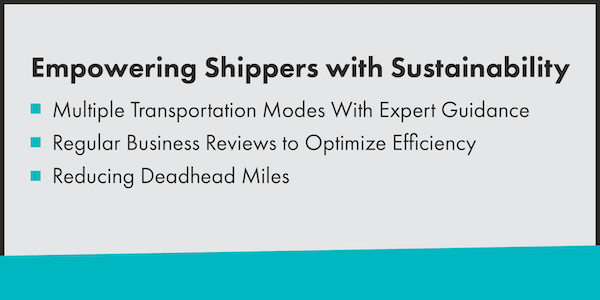
Additionally, we’re always looking to explore new ways to push the sustainability envelope for our relationships. Currently, we’re looking into platforms that can help us provide our shipper relationships an extra avenue to offset their carbon emissions, too, like Patch.io.
Ecovadis – Recognition of Trinity’s Commitment to Sustainability
EcoVadis, a trusted and globally recognized provider of business sustainability ratings, recognizes our dedication. In 2023, they awarded us a bronze medal, placing us within the top 50 percent of companies assessed. While we acknowledge this is a significant achievement, at Trinity, we aim to continuously improve. Our sights are set on achieving a silver rating in 2024, reflecting our ongoing commitment to continuous improvement.
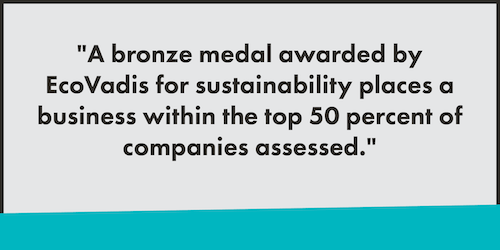
The Trinity Logistics Difference
As our mission statement says, we’re dedicated to “improving lives and supply chains by solving tough problems.” Sustainability is undeniably a complicated challenge. The good news is that our passionate Team Members at Trinity Logistics thrive on tackling tough problems and overcoming obstacles. We’re relentless in our pursuit of solutions, and we won’t stop until we’re satisfied with the results.
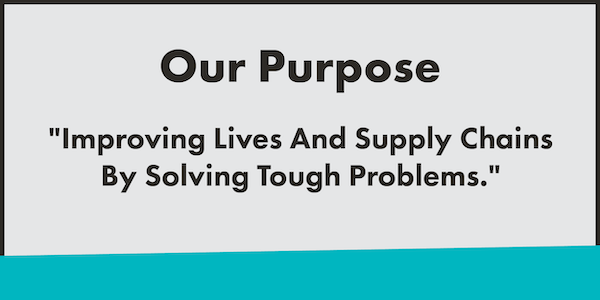
We understand sustainability is a never-ending journey of improvement. That’s why you can count on Trinity Logistics to remain a leader in sustainable practices. We’re constantly expanding our sustainability initiatives and deepening our commitment to a greener future.
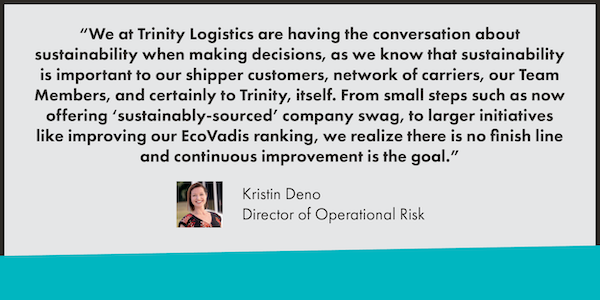
Our dedication to sustainability is just one facet of the Trinity difference. If this is how seriously we take environmental responsibility, imagine the level of commitment we bring to solving your logistics challenges.
DISCOVER HOW WE CAN HELP YOU ACHIEVE YOUR LOGISTICS GOALSMotor carriers aren’t the only ones affected by deadheading.
While every mile driven takes a toll on the environment, research shows that deadhead miles account for over a third of carbon emissions in trucking. In fact, 36 percent of trucks travel empty in the U.S. every day, averaging roughly 61 billion miles deadheading every year.
Simply put, deadheading is an inefficiency problem within the logistics industry, one that we all know we need to improve. According to a survey by Convoy, 69 percent of respondents said reducing deadhead miles is important to them. By reducing deadhead miles, both shippers and carriers can slash their supply chain costs while also making an environmental impact.
WHAT IS DEADHEADING IN TRUCKING?
Deadheading, deadhead miles, or empty miles – they all mean the same thing – that a truck is driving empty. Usually, this happens once a driver has made a delivery to the receiver, and they don’t have freight to pick up until their next destination. This means they drive empty back to the original shipping point or to their next pickup location. Empty miles waste time for a carrier by failing to generate revenue. It also causes them to incur extra operating costs and contribute more emissions into our atmosphere.
Ideally, the most efficient use of a carrier’s time is finding a backhaul shipment. This is a nearby shipment that needs to be picked up and delivered close to or at their next destination, so either their pickup origin or next pickup.
HOW DEADHEADING POSES PROBLEMS
We’ve already discussed how deadheading contributes to C02 emissions and how carriers lose money running deadhead miles, but what about shippers? How are they affected?
Well, those carriers need to make up the money and time they lost deadheading somehow. They’re likely to charge a higher rate on their following shipments to do so.
Also, driving empty miles can be dangerous when severe weather occurs. A truck can weigh about half its weight empty than when it’s full, making it more susceptible to accidents. While truck drivers are trained in managing high winds and road safety, that’s often with a full truck and not an empty one. The same winds that shake a passenger car have been known to flip an empty truck.
WHY IS DEADHEADING SO COMMON?
It’s often difficult for a carrier to find their own backhauls, nor do shippers have the time to focus and invest their time in them. They need the truck to pick up and deliver and return to pick up the next shipment, not thinking of the in-between. Other carrier relationships and contracted shipments can get in the way, making it difficult to arrange or find backhauls.
HOW TO REDUCE DEADHEADING
It’s possible for shippers to keep backhauls for carriers in mind to both help keep carrier relationships moving and make headway on sustainability initiatives.
Make Use of Technology
Technology makes it much easier to match a truck with an available shipment. You can make use of digital freight matching (DFM) tools like Trucker Tools or DAT, which give shippers and carriers an easier way to find each other and match up based on suitable capacity for a shipment. Automation and machine learning in those applications help quickly find and create those matches.
A transportation management system (TMS) can also be helpful here. A TMS brings together information on all shipments and digital freight networks to help make sure trailers are utilized fully and backhauls gain the coverage they need. A TMS also gives you the opportunity to optimize your routes to reduce any deadheading.
Consider Consolidating Your Freight
Combining your partial shipments into a full truckload to one distribution point to then be delivered by a regional carrier or vice versa can allow for fewer empty miles and trucks on the road, saving you money and reducing your emissions.
Consider Continuous Move Planning
This plan involves stringing loads together to make the most of fleet utilization and driver time by bundling low-volume and high-volume lanes together. Carriers will add lanes across many customers, creating closed-loop routes to keep freight moving constantly. As a benefit, shippers often receive per-mile rates since they are making use of a carrier’s empty miles. This can be a bit more complex, but with a TMS and proper communication, can be an effective way to reduce deadheading.
TRINITY CAN HELP YOU REDUCE DEADHEAD MILES
Deadheading is an industry-wide problem that we all need to work on together to resolve. Carriers need to dedicate time for searching and finding backhauls, just as shippers need to work with carriers to reduce their empty miles. That’s one way an intermediary, a 3PL like Trinity Logistics, can step in and help. We can work with both parties to arrange shipments so that each company has its unique needs met.
We have over 40 years of experience arranging shipments between shippers and carriers. Our Team of experts can help shippers plan and organize their shipments and recommend freight consolidation strategies when it’s suitable. We also have a Carrier Development Team dedicated to growing our carrier relationships by learning their wants and needs. We reach out and gather their preferred lanes and capacity to better match them to available shipments to keep them moving and generating revenue.
Trinity Logistics is also recognized as a Green Supply Chain partner for its sustainability initiatives and solutions available to offer shippers more options for their logistics that can reduce their carbon emissions.
If you’d like to talk to one of our experts about your shipping needs and find more sustainable options, click the button below so we can get started.
GET A FREE, NO-OBLIGATION SHIPPING QUOTE